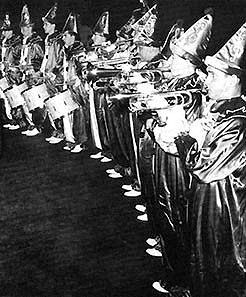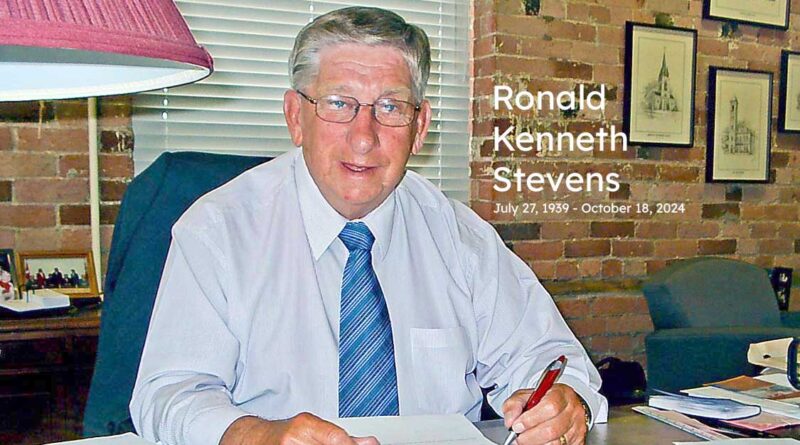Remembering Ron Stevens
By John Swartz
Ronald Kenneth Stevens passed away October 18. He was 85-years-old. What follows is a recollection of who he was, his contribution to the City of Orillia from many years of conversations.
Ron Stevens was the kind of mayor Orillia needed at the time he took office in December 2000. The city was still caught in an austerity mode following from the panic and concern the City had accumulated too much in the late 80s and through the effort to not spend money in the 90s and instead divert tax revenue which would have kept things like the roads in good repair and plowed properly.
It didn’t help Mike Harris downloaded, or shirked, responsibility for its share of things like road building and infrastructure maintenance onto municipalities with no resources to pay for the things we use every day but pay little attention to.
Add a flagging local economy caught in the slipstream of globalization which brought factory closings and retrenchment of several American owned local businesses back to their home offices.
Stevens was the kind of conservative-minded politician who had progressive ideas and vision for how to pump blood back into the community.
He wasn’t perfect, not everyone was on side for where he took us. But, he managed to mitigate opposition, or convert people to a direction and in hindsight, we can see all around us the legacy of what he brought to Orillia .
He could have stood in the way of bringing the Mariposa Folk Festival home. He was after all from the segment of the community that drove it way in the first place. Likewise, when the arts community and those with a long-range point of view got the argument some made arts was going to be the way forward. He understood people don’t vacation in the great industrial destinations of the world, they go to Rome, they go to Paris, they go to New York City. They go to see the Coliseum, The Eiffel Tower and the Louvre, they go to see a play on Broadway. They go to hear the great orchestras of those places, see the art hanging on museum walls, and eat the food identified with those locales.
So he embraced the argument other community leaders, Michael Jones, Roy Menagh, Bob Brown and others investing in and supporting all our arts would put Orillia on the map and draw tourists. We, after all, had this notion Orillia was no longer the industrial driver of the provincial economy it used to be and had become a tourist town, so we better do things to bring more tourists. The side benefit was a healthy arts community which had local government support also made Orillia an attractive place to live. If one is going to relocate and call living on the shores of two lakes close to winding roads through rolling hills and a short drive to Georgian Bay and Blue Mountain, one also had to have a workplace to go to Monday to Friday. That meant our economy would in turn reshape itself into new subgroupings of economic strata.
The result was commissioning a study to find out what our arts economy looked like, since no one had ever thought to do so before, and look at the broader world to see where we could fit in. It turned out the arts economy was bigger than anyone thought it was and the conclusions of the study led to the creation of a dedicated culture department; Orillia was one of the first in Ontario to do so. Between 2005 and 2011 the hidden economy blossomed to the point it was strong enough to survive subsequent lack of understanding and dismantling of the department; it persevered despite not being given it’s due and today is recovering
But we had a problem, the workforce is more than people with training and developed skills to shepherd a new economy that wasn’t reliant on smokestacks, it also needed workers with skills many Orillians didn’t have. We needed better education facilities and programs.
So he embraced a group, (Don Ross, Bruce Waite, Will McGarvey, Anderson Charters and the rest of the weekly poker posse were ringleaders) when they came to him and said we need a university. This was not a new idea. Scout Valley exists because decades ago it was earmarked as the home for a new university. For several decades many people had carried the torch lighting a dream of starting a new university.
So he looked at the room, the combined civic weight represented by the people seated at the table and the breadth of their experience in business and community building and supported them. He agreed to put the resources of the City and its administration in to play and created a Mayor’s Task Force to make a university a reality.

It’s not it was going to be an easy task, or that it was easy. In fact it was a chance meeting in a Queen’s Park office between Stevens and Lakehead University’s president, Fred Gilbert; they were both on a similar mission. Stevens was there to convince the ministry to put Orillia on a list of places to expand the province’s stock of universities and Gilbert to twist some money out of the provincial budget for Lakehead to expand. When Stevens learned why Gilbert was there, he euphemistically said, “have I got a deal for you.”
That is exactly when the snowball started to roll down the mountain to the point establishing a satellite campus of Lake Head University in Orillia was unstoppable. At the same time, Stevens did all he could to increase the kind of course offerings and size of the student body at Georgian College to benefit the kinds of business Orillia wanted to attract.
Unfolding alongside all that was the idea first broached in 1999 by the Orillia Public Library Board Orillia needed a new library building because the old one was inadequate and could not be expanded on.
He embraced the idea of constructing a new library building, and his position as the head of council carried weight moving the project forward through various stages of council approvals needed to plant the first brick. There was a string of nine-nothing votes to commission feasibility studies, concept designs and etc. despite several councillors not being totally on board to spend several millions on construction. Remember, we were emerging from a period of belt tightening that was causing indigestion, a condition many people and some councillors thought was normal.
He also understood the argument to also redevelop Market Square, to modernize it with the infrastructure vendors had been wanting for decades, so long as it would not shrink in size. I was part of the cultural roundtable that held the community forum to see if there was public interest in including the square into the library project and as member of the library board ensured the new market was not one square meter smaller than the old market. True, there turned out to be significant opposition from vendors who did not get they weren’t losing space and gaining electricity and water in the mix, but we both knew the market facilities would be measurably better than what existed at the time.
This remembrance is not sourced from anything other than this writer’s memory of the events as a journalist, and a member of municipal committees and direct conversation with Stevens. In that vein this anecdote is offered.
This author was a member of the Orillia Public Library Board for two and a half terms ending in 2006, serving as vice-chair and chair of the budget committee. That is to say I was involved with the investigation and planning, and advocacy with council for erecting a new library from the beginning. But, Orillia has term limits for service on committees of council, one could not serve more than two full terms in a row..
One of the things I and board chair Catherine Dowd instituted was a culture of forward planning for the direction of the library service and the composition of the board, succession planning of a sort. It was the culture which led to a realization mid-term Dowd and the board had a problem. The board would undergo an almost 100% turnover beginning with a new term in 2010. There would be no one on board with any institutional knowledge of what had occurred with the evolution of how the board operated, nor the process of constructing a new library (i.e. enough knowledge to complete the project).
With that understanding Dowd called me to ask if I would consider returning to the board mid-term, and then be able to serve for two more full-term appointments. She explained the reasoning for asking, but all I could offer was, thanks for thinking I should be the one to carry things on, but I’m only not there because of term limits and it’s unlikely I’d be able to return until 2010.
She had that based covered, explaining she’d already talked to Stevens and alerted him to the unfavourable scenario the board was facing and the board’s solution. She told me Stevens was in favour and would make sure the term limited was waived so I could return to the board, but Stevens wanted to speak with me before bring it to council.
I made the trip to Stevens’s third floor office at City Hall. We had always enjoyed business and personal conversations in that setting. He asked some questions about my commitment, I said I could be as involved as I had been. The meeting ended with Stevens saying he would introduce the motion, he would make sure it passed, but I had to, “make sure that library gets built.”
All that is to illustrate Stevens understood the importance of a modern library to long term health of the community and economy, especially in light of the other things happen re: Lakehead and Georgian college. He used every mechanism available to make it reality.
It’s not there wasn’t controversy during his ten years in office. He wanted to build a recreation center on the West Street former industrial land owned by Molson’s. It was the logical choice if the inherent risk of containing contamination of the site could be worked out. Several people in the community would not and could not buy containing the risk was achievable, and there was the cost, which escalated each year of delay in construction. In the end a mitigation was engineered and the facility built.
Then there was the opposition to building a sewer line through Scout Valley to service the west side of Orillia across Highway 11. Council voted in favour. Stevens, sided with the majority even though he did not like the idea. But during the chamber of commerce debate a couple weeks before the 2006 election, of which Scout Valley was the major issue, Stevens waltzed into the council chamber with a signed conservation deal naming the Couchiching Conservancy as stewards of the new park and thus preventing any development of the property for 99 years. I was there, that was the moment Stevens won the hotly contested election.
Ron’s Character
Another personal aside to illustrate how Stevens assembled consensus and set direction. During the election for the 2000 council. I was one his opponents for the mayor’s job. I had already made statements about the interloper, the carpetbagger from Severn Township wanting to jump ship.
We had not met until the day of a Rotary Club of Orillia Meet the Candidates luncheon. For several reasons, I am in the habit of arriving to things early and scoping out the room and situation, so I headed to the front of the room, the stage, and grabbed what I thought was the best chair to be seen in. Right behind me was Stevens who sat next to me. He leaned over and said, “What did you play in the drum corps?”
You have to understand even today, but less so then, no one asks about drum and bugle corps unless they too came from that background. I just turned my face toward him and said, “Where did you march?” because the only explanation for the question he asked was he too had been in a drum corps.

It turned out he wasn’t just a business owner, an experienced politician, but he was a drummer – a snare drummer as the 50s turned into the 60s in the relatively well-known Jolly Jesters (later just The Jesters) of Toronto. He was a generation before me, but I knew of the notoriety of that drum corps and in fact knew many of the people from his era he also knew.
This was the start of a friendship based on something we both experienced few others understand. There are life-long lessons to take away of being in a drum corps. One learns your role completely; you rehearse your part for months, not just to the point of memorization, but to the point of how your individual part fits into the whole and why. You learn to get along with others for a common purpose. You learn to have a plan, on paper, and follow it. You understand the goal and the path and if you have to deviate, you need to understand why and embrace change as necessary to achieve the goal. You work hard and keep your attention focused.
You don’t win in the end – we win. It’s a group effort with no one person making the winning basket or scoring the decisive goal. Your effort is only a part of a winning formula because everyone needs the same commitment, but your lack of effort can make everyone a loser.
Those are the things I would have brought to the job if I won the election and I knew it would be the same for Stevens if he won. There is something about being in a drum corps that forms the character one takes onward into life. I was certainly disappointed not to win, but was comfortable he did. I understood the City would be in good hands. My belief turned out to be correct because Stevens organized and led a charge into the future we are all benefitting from today.
It’s not just Lakehead, Georgian, the library, or saving Scout Valley, but the expansion of Soldier’s Memorial Hospital, a revamped transit system, laying the groundwork to make our waterfront and Tudhope Park what they are today as well. He also turned the table and thinking regarding the neglect of the City’s infrastructure, which successive councils where able to capitalize on.
He understood it was not enough to hang out a for rent sign to attract desperately needed new business. Nobody would come if the big picture was not sketched out, largely filled in and the remainder being worked on. He built, or laid groundwork to put those pieces in place.
While landing Hydro One for Orillia was not on the menu while Stevens was in office, and not to diminish the foresight and work of Mayor Steve Clarke and councillor Ted Emond, it’s likely the decision makers at Hydro One would not have looked at Orillia if the things Stevens accomplished or started while in office weren’t there to see.
He was the right person, with the right vision, at the right time. His legacy will live on far longer than his time with us. He was one of the great people to have been in the orbit of my life, and one the citizens of Orillia should always remember. So long old friend.
A service to celebrate Ron’s life will be at Cornerstone Baptist Church Monday, November 18 at 11 a.m. with visitation 1 hour before.
(Photos by Swartz – SUNonline/Orillia; Images Supplied) Main: Ron Stevens in a photo used for a Packet and Times Progress Edition story in 2007.




